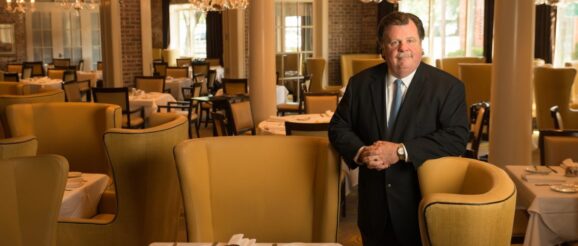2,000 Greater Houston Restaurants Closed In 2020. Innovation Is A Priority For Those That Remain – Houston Public Media

After Hurricane Harvey, Three Brothers Bakery owner Janice Jucker said she developed a formula for recovering from disasters. She and her husband had been through enough of them to fully understand how crippling they can be.
“We call ourselves the king and queen of disasters,” Jucker said. “We’ve been through four floods, a fire, a hurricane, and a drop in the price of oil.”
At least with hurricanes and floods, there’s a beginning and an end, Jucker said. The ongoing pandemic has separated this disaster from the rest.
Paycheck Protection Program loans provided some necessary relief, but part of the restaurant’s formula for surviving also included doing as much as possible to prevent an outbreak in the bakery. They focused on budgeting for enough cleaning supplies, and implementing e-receipts for customers.
But despite a predictable loss of income early on, Three Brothers Bakery never had to cut staff, which is a necessary part of Jucker’s formula for recovery.
“Your team is everything,” Jucker said. “If you let your people go, or lay them off, you can’t reopen. They may not be there.”
Three Brothers has managed to stay open, but the same can’t be said for roughly 2,000 kitchens in Greater Houston.
To embed this piece of audio in your site, please use this code:
The Greater Houston Restaurant Association, which has served as a connector between area restaurants and government assistance, said 14-16% of restaurants in the region have closed their doors for good.
“2020 was on pace to overall have an increase in restaurants in Houston had we not faced the pandemic,” said Melissa Stewart, GHRA executive director. “We had some great groups moving in, big and small. But that slowed.”
Following Hurricane Harvey, restaurants suffered “months and months” of loss due to not just lack of revenue, but also loans and other programs they had to take advantage of just to stay afloat. The result was a lack of expansion in Houston’s restaurant scene from 2017-2019, Stewart said.
But 2020 was supposed to be the year restaurants bounced back. Now, Stewart fears the pandemic will make history repeat itself.
“What we saw was we had folks who were planning to open, planning to expand who may have slowed down a bit, but that was still their plan,” Stewart said.
It’s been a mixed back of restaurants who’ve had to close their doors this year, with both sole operators and chain restaurants having to close multiple locations.
Innovative ideas, like curbside pickup, has been the key for restaurants who are still operating. But even with that it’s been a challenge.
Unlike Three Brothers Bakery, The Breakfast Klub, a downtown soul food favorite, did have to cut staff.
But in unconventional fashion, they actually told employees early on to seek unemployment, which was more attractive at the time than what the restaurant had to offer.
“I don’t disagree with a man finding a way to make a few extra dollars to feed his family,” said Breakfast Klub owner Marcus Davis. “We said to people, ‘hey, we don’t want you to be without, and we don’t want you hanging on to 20 hours a week if you can’t feed your family.’”
Normally, about 80% of Breakfast Klub diners would choose to eat inside the restaurant, Davis said. Being forced to switch over to all takeout and curbside pickup resulted in a significant drop in sales in the first half of the year.
But the pandemic also created additional costs, with the need for personal protective equipment, and additional cleaning supplies.
Online orders were picking up as well, so Davis was forced to create four new pandemic-related positions in order to prevent needless touching, and lower the risk of an outbreak at the restaurant.
“We had to create a position where a person just stands there, and hands out all the condiments,” Davis said. “These additional positions we added in order to get sales back to where we needed them to be. So in order to keep people gainfully employed, we had to employ more people.”
Cutting staff and dine-in service has been difficult for restaurant owners — especially for some older institutions, like Brennan’s of Houston.
“I’m in it for the people,” said owner Alex Brennan-Martin. “The people that work for me, and my customers. When I have employees of 45 years, 38 years, and so on and so forth, the relationships that you build with those people are very different than most other careers and businesses.”
As a restaurant known for putting on parties and events, the pandemic hit Brennan’s hard, with many of diners being from the oil and gas industry.
“I stopped keeping a list of my customers that I saw going bankrupt,” Brennan-Martin said. “The pandemic on top of the oil bust has been just traumatic.”
While Brennans’ did have to cut staff, the biggest issue they’ve faced is a a lack of insurance.
In past disasters, like hurricanes, some restaurants could rely on business interruption insurance. But Brennan-Martin said that wasn’t available for this disaster.
“In this case, there were specific exclusions in the policies for pandemics,” Brennan-Martin said. “We certainly have those exclusions in our policy, who would have thought in 2020 we’d ever need it?”
Yet they’ve fought through, amping up delivery food services, like every Houston restaurant has had to do this year.
And despite the challenges along the way, Brennan-Martin said he’s is holding out hope for the future.
“The Roaring Twenties came after the 1918 Spanish Flu Pandemic,” he said. “I believe we’re going to see a bounce back.”
Fill out the form below to subscribe our new daily editorial newsletter from the HPM Newsroom.
